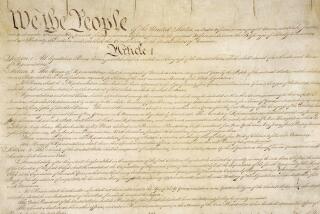Marshall on Constitution: ‘Defective From Start’
- Share via
WASHINGTON — Distancing himself from the “flag-waving fervor” and the spirit of celebration that has accompanied this year’s 200th birthday of the U.S. Constitution, Supreme Court Justice Thurgood Marshall said Wednesday that the original government plan was “defective from the start” and required “two turbulent centuries” to correct.
“The true miracle was not the birth of the Constitution, but its life,” Marshall, the first black to sit on the high court, said in a speech delivered to a legal convention in Maui, Hawaii.
He pointed out that in 1787, the Constitution’s framers left out a majority of Americans--women and blacks--when they wrote the phrase, “We the People.”
Less Reverential View
Marshall’s remarks, made available to reporters here, were a rare departure from the outpourings of unqualified praise from many high public officials that have dominated the year-long celebration of the document’s drafting. They were a distinct counterpoint to the reverential views of former Chief Justice Warren E. Burger, the celebration’s national chairman, who has referred frequently to the constitutional convention as the “miracle at Philadelphia” in his many speeches on the observance.
Despite the attention paid to democratic government in the original four-page parchment document, it took the Civil War and the three constitutional amendments that followed it--the 13th, 14th and 15th--to abolish slavery and give all citizens “equal protection of the laws,” Marshall said in his address to the San Francisco Patent and Trademark Law Assn. The 19th Amendment, ratified in 1920, gave women the right to vote.
“I do not believe that the meaning of the Constitution was forever ‘fixed’ at the Philadelphia convention,” Marshall said, rebutting a view put forth by Atty. Gen. Edwin Meese III. “Nor do I find the wisdom, foresight and sense of justice exhibited by the framers particularly profound.”
Marshall said that several members of the constitutional convention voiced “eloquent objections” to slavery, but they “eventually consented to a document which laid a foundation for the tragic events that were to follow.”
Notorious Dred Scott Case
In 1857, the Supreme Court relied on the debates of the original constitutional convention to conclude in the notorious Dred Scott case that blacks were to be viewed as property and not capable of becoming equal citizens. Even after the passage of the 14th Amendment, it took nearly 100 years for blacks to win full equality in American courts, he noted.
Marshall said he hopes that this year’s bicentennial celebration will not be a “blind pilgrimage to the shrine of the original document,” but rather will inspire “a sensitive understanding of the Constitution’s inherent defects, and its promising evolution through 200 years of history.”
More to Read
Sign up for Essential California
The most important California stories and recommendations in your inbox every morning.
You may occasionally receive promotional content from the Los Angeles Times.














